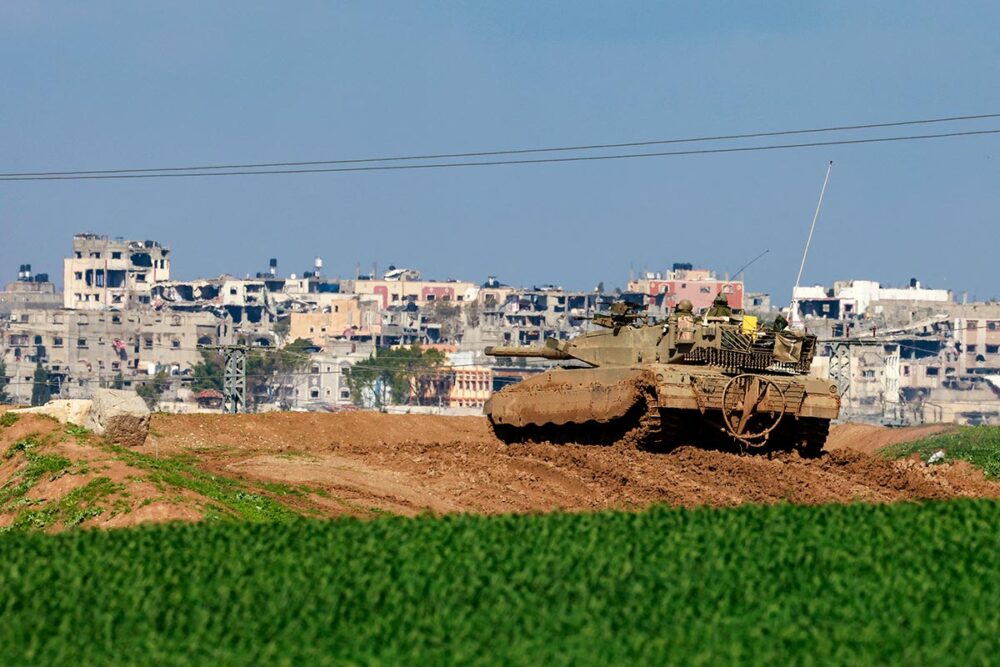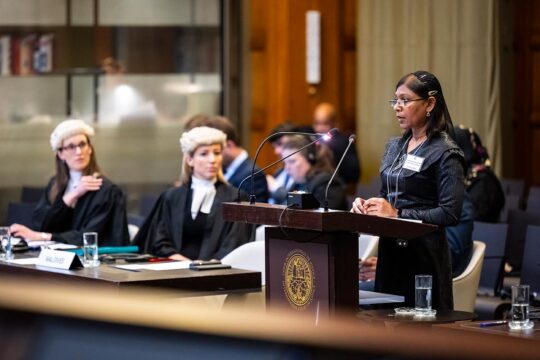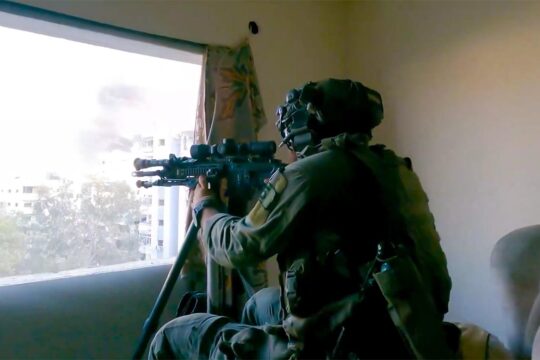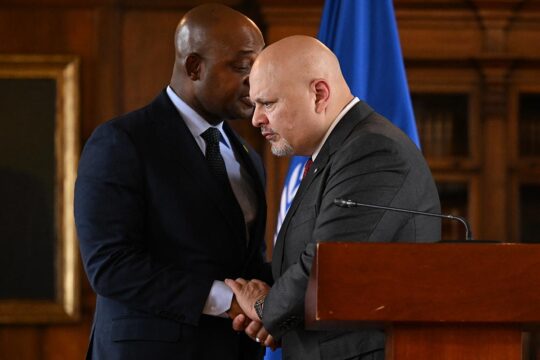In dapper morning dress, Nicaragua’s agent stood this week before the judges at the International Court of Justice (ICJ) to argue that Germany is breaching its obligations under the Genocide Convention and international humanitarian law by continuing to supply weapons to Israel and withdrawing its support to the UN body supporting Palestinian refugees, UNWRA.
This is the not the first time that Carlos José Argüello Gómez has acted as agent for Managua before the Hague-based ICJ. He made a pointed reference to the “striking similarity” of this latest foray in the Great Hall of Justice and the application Nicaragua filed 40 years ago. He was part of the team then that challenged the United States over its “serious violations of international law against its rights and sovereignty,” asking for the court to intervene to order that military assistance from the US to Sandinista rebels should cease. Over the past four decades, Nicaragua previously appeared as party before the court 13 times. Justina Uriburu of the European University Institute, Italy, says it is striking to have a country “that for the past 40 years has incorporated the decision to litigate before the court as part of its foreign policy, accepting all of the conditions of the engagement with that institution, which means sometimes you win, sometimes you lose.”
The new case has been brought alongside and in relation to South Africa’s genocide case at the ICJ against Israel, which has already resulted in judges issuing two sets of emergency rulings requiring Israel to increase humanitarian assistance to the 2.5 million civilians in Gaza. Nicaragua says it is “acting not only on its own behalf” but also “on behalf of the Palestinian people that is being subjected to one of the most destructive military actions in modern history.” But much of Nicaragua’s presentation, rather than focusing on the details of the plausible genocide and suffering in the Gaza Strip, following Israel’s invasion in October 2023 to crush Hamas and release hostages, is on German arms exports. The lawyers rely on the wording of the Genocide Convention that says all states have a duty to prevent genocide and on generally accepted “norms” in international law “to ensure respect of international humanitarian law.” This is “a different type of engagement with the court because Nicaragua is acting, let's say, as a guardian of ‘erga omnes’ obligations, that are allegedly violated by Germany and Israel. This is a concept that is used in international law to refer to these obligations that states owe to the international community, as a whole. Nicaragua is not only saying I am going to solve my disputes with a court, but I'm going to protect legal obligations and the international rule of law by suing other states to the court, which is conceptually a bit different.”
Hypocrisy and commercial interests
“I think everybody was surprised,” says Kai Ambos of Göttingen University that another case involving a third state would be brought following the South African one. “In particular because Nicaragua is not a state with a high reputation,” he says. “They brought this claim one day after the UN Human Rights Council investigative Fact-Finding Commission published a devastating report on the Ortega family dictatorship. This doesn't make the claim as such without any merit, of course it could have merit, but it's maybe not a good start for such an important claim.”
Daniel Müller, a member of Nicaragua’s legal team, outlined in court how last year Berlin authorized more than €326 million exports “of military equipment and war weapons” to Israel. “Most of these licences were granted in the second half of 2023, after the invasion of Gaza by Israel,” he pleaded. He quoted a variety of German officials justifying the continued support to Jerusalem. “The fact that Germany is engaged in facilitating or improving humanitarian aid in Gaza for its suffering people does not change the picture,” he said after quoting the German Foreign Minister referring to the “hell of Gaza” while describing efforts to improve humanitarian access. Instead it is “a pathetic excuse to the Palestinian children, women and men in Gaza to provide humanitarian aid, including through air drops, on the one hand, and to furnish the weapons and military equipment that are used to kill and annihilate them — and to kill also humanitarian aid workers as most recently evidenced by the missile attack against vehicles and workers of World Central Kitchen, on the other hand.”
Argüello Gómez was even sharper. “There is another less noble reality that perhaps is not known by the generality of the German people: there is also a lucrative quid pro quo involved. German companies involved in the military industry are directly profiting from the situation as they have seen their share prices rise since 7 October and they have substantially increased the joint development contracts for weapons with their Israeli counterparts,” he argued. “Israeli companies proudly advertise their products as ‘battle-tested’. Needless to say, that for years the international community has been aware that the testing field is Palestine and its people, particularly Palestinians living in Gaza.”
Germany’s dilemma
Alain Pellet, a veteran French lawyer who also represented Nicaragua before the ICJ 40 years ago, dealt with expected arguments from Germany that because the case concerned Israel’s conduct yet Israel was not one of the parties, the case should be thrown out. “It is not a question of whether Israel has failed in its international obligations, but whether Germany has failed in its own. Germany was and is fully aware of the risks of using the weapons it supplied and continues to supply to Israel to commit genocide against the Palestinian people. And it goes without saying that the genocide in question would be internationally illegal if committed by Germany itself. It is a matter of the utmost urgency that Germany should at last suspend the aid and assistance it provides for this purpose; such aid and assistance fall fully within the definition of complicity incriminated, as such, by Article III of the [Genocide] Convention,” Pellet told the court.
Tania von Uslar-Gleichen, legal adviser and director-general for legal affairs at Germany’s Federal Foreign Office said that “Israel’s security has been at the core of German foreign policy.” She repeated many of the quotes Nicaragua had brought from German officials regarding Israel’s conduct of the war but said: “They are not proof, as claimed by Nicaragua, that Germany is failing to live up to its responsibilities. On the contrary, calling for the adherence to international law does not constitute the manifestation of its breach. To us these quotes prove that Germany is fulfilling its obligations to ensure respect for international humanitarian law”. In fact, “Germany is the largest individual donor of humanitarian assistance,” she stressed and it works “not only via UNRWA but also organizations like OCHA [The UN Office for Coordination of Humanitarian Affairs], the World Food Programme, the ICRC [International Red Cross Committee] and the German Red Cross.”
“The entire international community is grappling with the political, moral and legal dilemma posed by the situation in Gaza,” she said. “The principles I have mentioned – protection of Israeli security and support for the rights of Palestinians – have required Germany to make difficult choices.”
Nicaragua’s weak spot
On arms exports Christian Tams, a member of Germany’s legal team, stated that “the picture presented by Nicaragua is at best inaccurate; and at worst, it is a deliberate misrepresentation of the actual situation. For every licence that is granted, the German government carefully assesses whether there is a clear risk that the particular item subject to licensing would be used in the commission of genocide, crimes against humanity or grave breaches of the Geneva Conventions of 1949. This requirement follows from binding rules of German and European law, which exceed international requirements.”
Samuel Wordsworth, another adviser for Germany, focused on what may prove Nicaragua’s biggest stumbling block: the lack of an established dispute between the two countries. It was “just 17 days after Germany received Nicaragua’s Note Verbale, [that] the current proceedings were commenced without prior warning, relying for the supposed existence of a dispute on a few words by a governmental representative in a general press conference,” he noted. Nicaragua’s agent had acknowledged the “timescale and bilateral level of intercourse was not lengthy and extensive” but he justified the brevity against the backdrop of “ongoing genocide,” and said, “it would be a blind retreat into formalism to require round upon round of diplomatic exchanges.”
Apparently, Nicaragua sent the same email beginning the dispute in February to three other states - Canada, the Netherlands and the United Kingdom - to their public information emails rather than directly to the ambassadors in Managua. “Germany was actively considering its response and seeking co-ordination with the three states that had received similar emails when, without warning, Nicaragua commenced the current proceedings on 1 March,” Wordsworth said.
National legal suits
Two of Nicaragua’s demands for emergency measures against Germany concern arms exports, asking to stop them. The third measure asks for UNWRA’s funding to be completely restored. “It's very unlikely that the court will accept Nicaragua's request as a whole,” says Ambos. “I especially do not think that the court will ask a state to suspend or cease supply weapons to another state. It would be difficult to think that the court would impose such an obligation on a third state. I think the court would just be too cautious.”
But if it did, perhaps the biggest impact would be “on the national level,” he says. A few days ago there was a claim filed at the administrative court in Berlin, he notes, which basically runs along the same lines as a recent Dutch appeals case, arguing “that Germany cannot provide weapons to Israel given the IHL [international humanitarian law] violations and the plausible genocide of Israel.”







